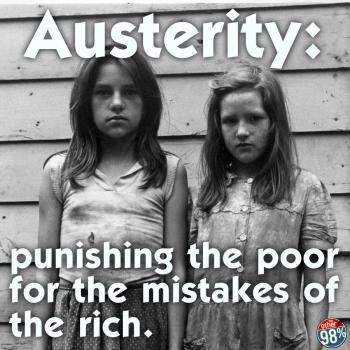Debunking the balanced budget superstition .[embedded content] The balanced budget paradox is probably one of the most devastating phenomena haunting our economies. The harder politicians — usually on the advice of establishment economists — try to achieve balanced budgets for the public sector, the less likely they are to succeed in their endeavour. And the more the citizens have to pay for the concomitant austerity policies these wrong-headed politicians and economists recommend as “the sole solution.” One of the most effective ways of clearing up this most serious of all semantic confusions is to point out that private debt differs from national debt in being external … A variant of the false analogy is the declaration that national debt puts an
Topics:
Lars Pålsson Syll considers the following as important: Economics
This could be interesting, too:
Lars Pålsson Syll writes Schuldenbremse bye bye
Lars Pålsson Syll writes What’s wrong with economics — a primer
Lars Pålsson Syll writes Krigskeynesianismens återkomst
Lars Pålsson Syll writes Finding Eigenvalues and Eigenvectors (student stuff)
Debunking the balanced budget superstition
.
The balanced budget paradox is probably one of the most devastating phenomena haunting our economies. The harder politicians — usually on the advice of establishment economists — try to achieve balanced budgets for the public sector, the less likely they are to succeed in their endeavour. And the more the citizens have to pay for the concomitant austerity policies these wrong-headed politicians and economists recommend as “the sole solution.”
One of the most effective ways of clearing up this most serious of all semantic confusions is to point out that private debt differs from national debt in being external … A variant of the false analogy is the declaration that national debt puts an unfair burden on our children, who are thereby made to pay for our extravagances. Very few economists need to be reminded that if our children or grandchildren repay some of the national debt these payments will be made to our children or grandchildren and to nobody else. Taking them altogether they will no more be impoverished by making the repayments than they will be enriched by receiving them.
Abba Lerner The Burden of the National Debt (1948)
Few issues in politics and economics are nowadays more discussed — and less understood — than public debt. Many raise their voices to urge for reducing the debt, but few explain why and in what way reducing the debt would be conducive to a better economy or a fairer society. And there are no limits to all the — especially macroeconomic — calamities and evils a large public debt is supposed to result in — unemployment, inflation, higher interest rates, lower productivity growth, increased burdens for subsequent generations, etc., etc.
No matter how much confidence you have in the policies pursued by authorities nowadays, it cannot turn bad austerity policies into good job-creating policies. Austerity measures and overzealous and simple-minded fixation on monetary measures and inflation are not what it takes to get our limping economies out of their present-day limbo.  They simply do not get us out of the ‘magneto trouble’ — and neither do budget deficit discussions where economists and politicians seem to think that cutting government budgets would help us out of recessions and slumps. In a situation where monetary policies have become more and more decrepit, the solution is not fiscal austerity, but fiscal expansion!
They simply do not get us out of the ‘magneto trouble’ — and neither do budget deficit discussions where economists and politicians seem to think that cutting government budgets would help us out of recessions and slumps. In a situation where monetary policies have become more and more decrepit, the solution is not fiscal austerity, but fiscal expansion!
We are not going to get out of the present economic doldrums as long as we continue to be obsessed with the insane idea that austerity is universal medicine. When an economy is already hanging on the ropes, you can’t just cut government spending. Cutting government expenditures reduces the aggregate demand. Lower aggregate demand means lower tax revenues. Lower tax revenues mean increased deficits — and calls for even more austerity. And so on, and so on …
